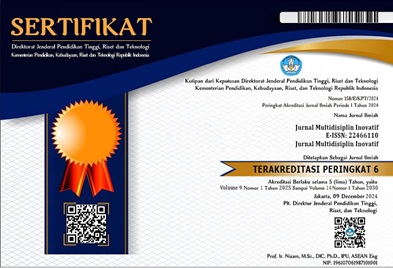ILMU SOSIAL PERSPEKTIF FILSAFAT ILMU
(Kajian Ontologi, Epistimologi dan Aksiologi)
Kata Kunci:
Filsafat, Pengetahuan, SosialAbstrak
Penelitian ini bertujuan menganalisis ilmu sosial dari perspektif filsafat ilmu, mencakup kajian ontologi, epistemologi, dan aksiologi. Dengan pendekatan kualitatif-deskriptif dan metode analisis teks, penelitian ini memanfaatkan data sekunder dari jurnal, buku, dan artikel yang relevan. Data dikumpulkan melalui studi literatur mendalam dan dianalisis secara interpretatif untuk menggali hubungan antara landasan filosofis dan penerapan ilmu sosial. Hasil penelitian menunjukkan bahwa ilmu sosial berlandaskan realitas sosial yang kompleks dan dinamis (ontologi), memanfaatkan pendekatan positivistik dan interpretatif (epistemologi), serta berorientasi pada nilai etika dan kebermanfaatan masyarakat (aksiologi). Implikasinya, diperlukan metodologi yang lebih adaptif dan inklusif dalam mengembangkan kebijakan sosial berbasis nilai, keberlanjutan, dan humanisme.
This study aims to analyze social sciences from the perspective of philosophy of science, encompassing ontological, epistemological, and axiological studies. Using a qualitative-descriptive approach and textual analysis methods, this research draws on secondary data from relevant journals, books, and articles. The data were collected through an in-depth literature review and analyzed interpretively to explore the relationship between philosophical foundations and the application of social sciences. The findings reveal that social sciences are based on the complex and dynamic nature of social reality (ontology), employing positivistic and interpretive approaches (epistemology), and oriented toward ethical values and societal benefits (axiology). This study concludes that a solid philosophical foundation is crucial for addressing contemporary social challenges. The implications highlight the need for more adaptive and inclusive methodologies in developing social policies grounded in values, sustainability, and humanism.





